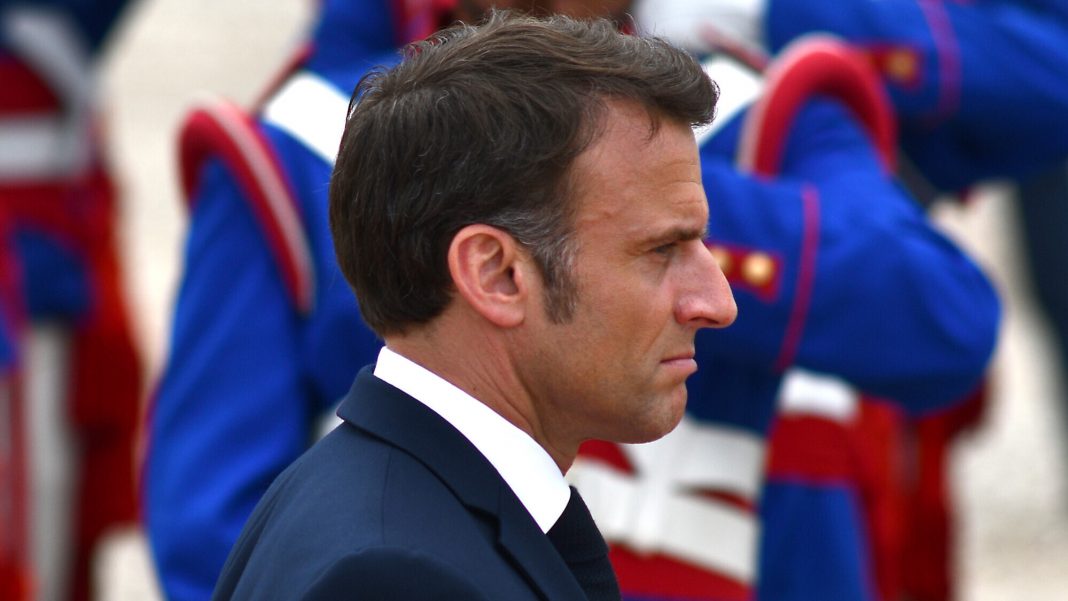The Summer Olympics that started in Paris, having drawn the attention of the French to the main sporting event of the quadrennium, put the political life in the country on pause.
However, not only for most French people, but also for French President Emmanuel Macron himself, the Olympics have become a temporary respite from the recent political battles. “We need a respite… but it won’t change anything. Nobody wants to give the victory to Macron,” former Renaissance MP Christoph Weisberg told Politico. The French president is taking time out to recover from the political turmoil that he himself, after all, provoked. First by calling early parliamentary elections, following his party’s crushing defeat at the hands of the extreme right, which campaigned on an anti-Macron platform, in the European elections. Then in the national parliamentary elections, where his coalition “Together for Rxpublika!” failed again, losing dozens of seats in the National Assembly. And in the final weeks before the Olympics, when tensions reached a peak and no party or coalition was able to form a government.
It is true that Macron leaves for the “Olympic pause” in not the worst of spirits. The post-election gloom has been replaced by notes of optimism: the left-wing alliance is torn apart by squabbles, the Macronist candidate Brown-Pivet has become the head of the National Assembly and for the first time there is hope on the horizon that Macron will “catch” the leftists and form the necessary coalition and a comfortable government for himself. Before our eyes, the French president from a “lame duck” is becoming more and more like a fairy-tale Phoenix bird rising from the ashes. At least the strategic initiative is back in his hands, as well as a fairly high chance of retaining power.
In this piece Ascolta analyses the current political situation in France against the backdrop of the intensifying political crisis, as well as the results of the recent election campaigns in France itself and the European Council. Special attention is paid to the current positions of Emmanuel Macron, as well as the mood among his inner circle.
This Content Is Only For Subscribers
Macron’s inexplicable logic
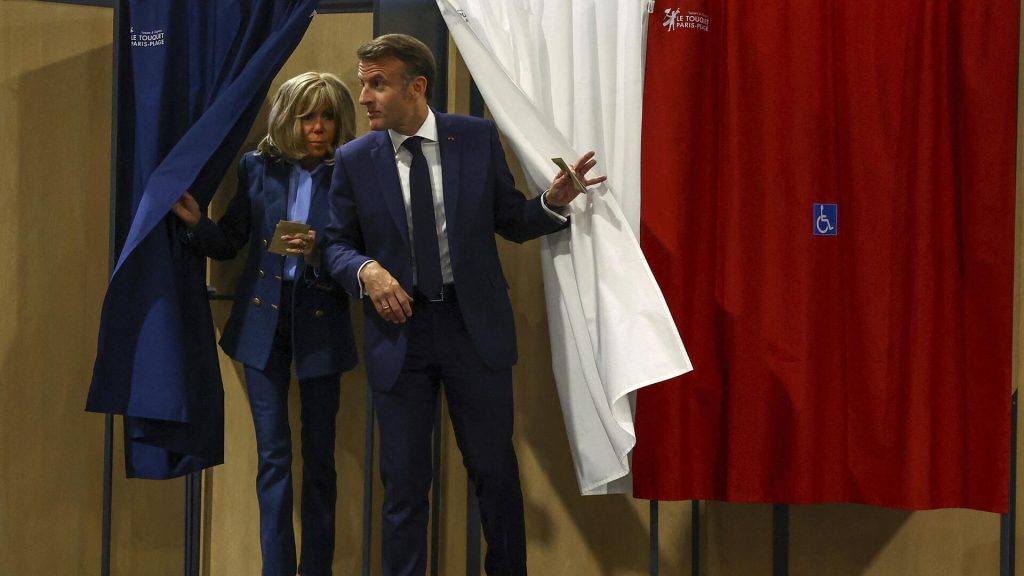
After Marine Le Pen’s National Rally (RN) party won the European Parliament elections with a solid 31.4 per cent result, President Emmanuel Macron announced the dissolution of the National Assembly. Macron’s shocking move overshadowed an impressive victory for the extreme right. In French history, no president has ever dissolved the national parliament in response to a defeat in the European Parliament elections. At the time, French MEP Raphael Glucksmann compared his country’s president to the Roman emperor Nero, who presided over the fire that destroyed his capital, as well as the Roman official who presided over the trial of Jesus.
Some experts and politicians have called the move a mere gamble, while others have transparently hinted that Macron is close to madness. Conspiracy experts began to discuss whether Emmanuel Macron’s announcement was the beginning of his third presidential campaign. Allegedly, by resigning, either voluntarily or involuntarily, and not completing his second presidential term, he will have a chance for a new re-election. By zeroing out his “terms” and leaving the country to his successor, Senate President Gérard Larcher, Mr Macron could have been elected for a third time as if nothing had happened. However, the president has discarded this assumption, saying that he is not going to leave the Elysee Palace until the end of his term, and called his decision to dissolve parliament a deliberate and responsible one.
According to a number of French media outlets, Gabriel Attal, the head of the Cabinet of Ministers, and most of the influential politicians of the pro-presidential party, suggested that Macron dissolve the government rather than the parliament: in their opinion, such a “democratic response” to voter discontent would have been sufficient. Instead, Macron decided to dissolve parliament – in consultation with only a few of his closest advisers, according to sources from the AFP news agency and Le Monde newspaper.
What was Macron’s calculation? First, by dissolving the National Assembly, Macron wanted to mobilise his voters and supporters of the disparate left-wing parties as much as possible. The threat of Le Pen’s team joining the government could quickly fulfil this plan. A lightning-fast election campaign under such conditions could help Macron to re-unite his supporters. Secondly, despite the fall in the Renaissance’s rating, Macron could expect to retain a significant number of seats in parliament for his party due to the specificity of the French electoral system. Elections here are held in 577 majoritarian constituencies in two rounds, and the MP’s seat goes to the one who wins more than the others in the second round. It is not easy to find 577 good candidates in a matter of days, experts said, which explains why the Rassemblement Nationale will not be able to replicate its pan-European success in the country. Thirdly, while the French are ready to send radicals to the European Parliament, which is “far away” and not very clear to the average voter, they are much more attentive to their vote at the national level and more often give it to centrists. And Macron’s bloc with his allies was right in the centre. But pretty quickly this plan ran into trouble. With the rise of extreme right-wing forces across Europe, yesterday’s truths no longer guaranteed the right outcome in the new political reality.
On 30 June 2024, the first round of extraordinary elections for the National Assembly took place. And as all sociological forecasts showed, Marine Le Pen’s National Rally party won with about 34% of the vote. In second place came the “New Popular Front” with 28%, rallying around itself leftist forces. But Macron’s coalition “Together for the Republic!” took only third place, gaining just over 20%.
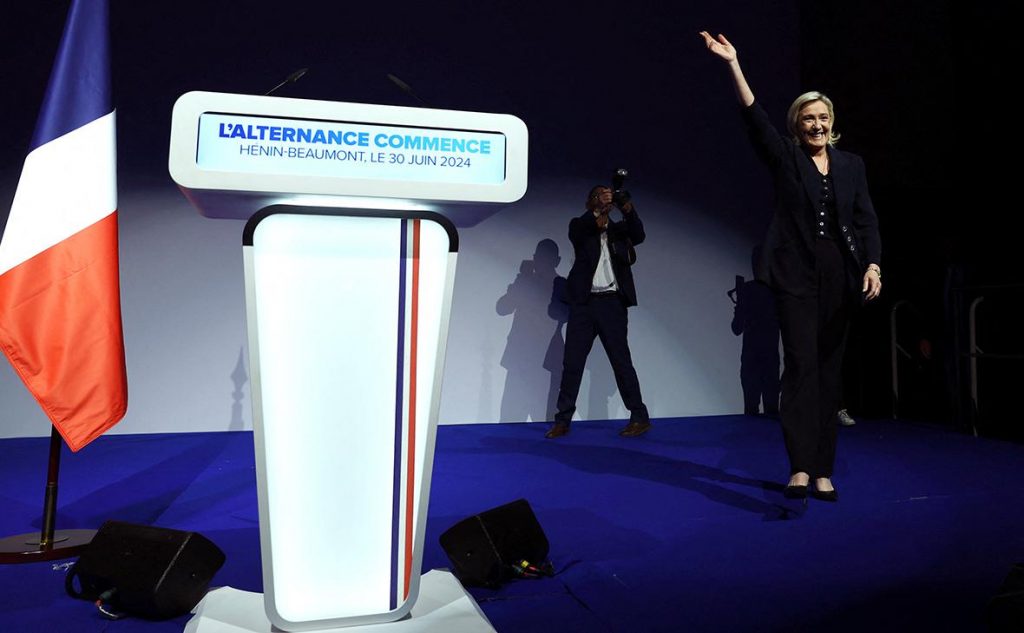
Macron’s bet that the real threat of Marine Le Pen’s National Union winning the election would make the French support the centrist coalition “Together for the Republic!”, which includes his Renaissance party, did not play out in the first round. Moreover, the first-round vote showed that voters fundamentally did not feel a significant threat from the far right. They attributed many unresolved problems in French society to the incumbent president and his government. First of all, when it came to immigration and its social consequences. But also the unsatisfactory state of the economy, crime, public security, the defence of traditional values and French national identity.
An unexpected problem arose for Macron on the left flank. He did not take into account the possibility of consolidation of the left, which reacted most quickly to the decision to dissolve Parliament and repeated the successful experience of 2022, when the left-wing coalition “New People’s Ecological and Social Union” (NUPES) with the dominant party “Unconquered France” received 151 seats in Parliament. The coalition was now called the New Popular Front. It includes Jean-Luc Melanchon’s LFI, the Socialist Party (PS), the Greens and the Communists. Jean-Luc Mélenchon and his supporters chose the name “New Popular Front”, apparently to draw an analogy between the French anti-fascist movement of the 1930s and the modern left against the threat of the far-right coming to power.
As two years ago, the coalition was led by the figure of Mélenchon, who was the first to call for unity under his banner. And this despite the fact that his protégé, the LFI candidate Manon Aubry, gained only 9.9 per cent in the European elections, while the PS candidate Raphael Glucksmann came third with 13.8 per cent. Negotiations lasted several days, intermittently interrupted, with tensions rising. The ultra-left, socialists, communists and Greens tried to bring their programmes to a common denominator. As strange as it may seem in the twenty-first century, the main obstacle to forming a coalition turned out to be the issue of anti-Semitism. Less than ten days before the first round, Raphael Glucksmann, the head of the Socialists’ European campaign list, said he had been the target of anti-Semitic attacks from the ultra-leftists of Jean-Luc Mélenchon’s Unruly France.
Glucksmann and Mélenchon have a history together. During the elections to the European Parliament, they constantly attacked each other. Now, despite having his leadership “stolen” from him, Glucksmann has joined the alliance and has been forced to moderate his ambitions and step back. Explaining his difficult decision to voters, he said that the far right was a far more dangerous threat than the ultra-left.
“Unconquered France” is, firstly, divided, secondly, just one member of an alliance. And an alliance of left-wing forces, he believes, could become the dam that will save French democracy. To everyone’s surprise, former President François Hollande, who was nominated from the Socialist Party in Corrèze, from where he once fought for the Elysee Palace, joined the ranks of the Popular Front. The creation of a broad coalition of the left led many French people to see it, rather than Macron’s centrist liberal party, as the best alternative to the right. In addition, the left put forward co-ordinated candidates in each of the constituencies. And although they were united more by their dislike for Macron than by sincere friendship and mutual understanding, the left managed to push the presidential party into third place.
In the fourth position on the results of the first round of extraordinary parliamentary elections was the party of the centre-right “Republicans”, which gained about 7%. It is worth noting that the heirs of Jacques Chirac and Nicolas Sarkozy were not without a high-profile scandal. After their candidate François-Xavier Bellamy received only 7.2 per cent in the European elections, they had to find their place with the growing strength of the extreme right. There were only two options – either to co-operate with Marine Le Pen’s party or to go their own way with unclear results. Eric Ciotti, chairman of the Republicans, clearly favoured co-operation with the Rassemblement Nationale, causing a terrible scandal in his own party. He was called a “traitor” and a “collaborator”, putting into this definition all the memories of French politicians who collaborated with the Nazis, and even demanded his immediate resignation.
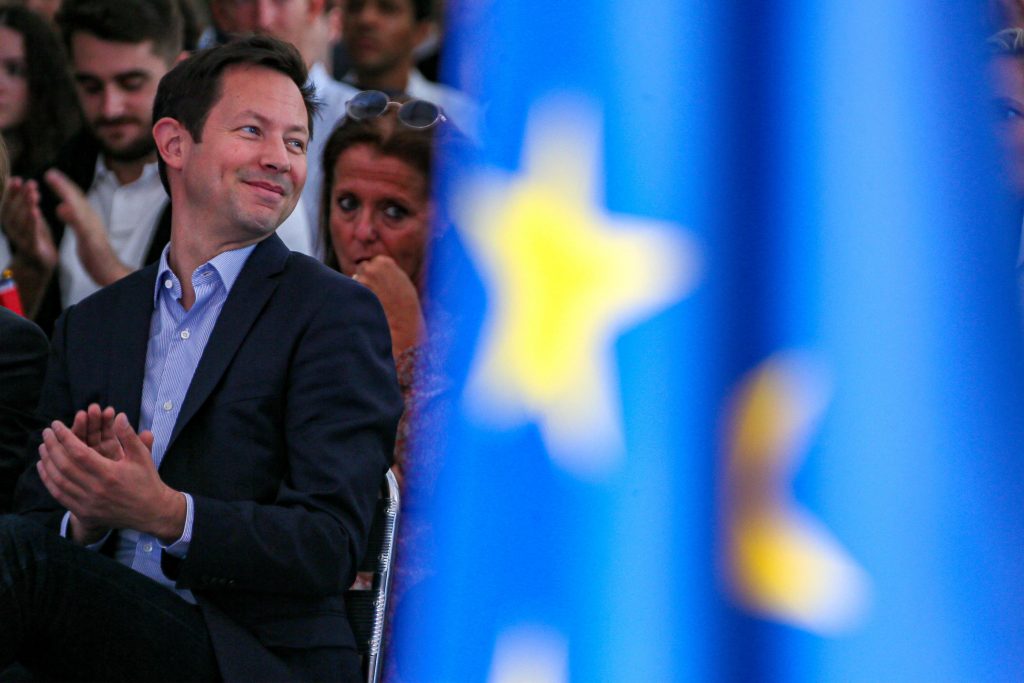
Former associates hastily gathered the party politburo to expel him from the ranks of the LR. But Ciotti is in absolutely no mood to resign or leave. “I am and remain the president of our political party, elected by its members,” he responded to the expulsion. All of this took place in public, with members exchanging angry comments on “X” (formerly Twitter), much to the amazement and despair of the remnants of their supporters. As a result, the Republican Party is splitting in two right before our eyes. At the same time, Ciotti still enjoys the support of some of his fellow party members. Some members of the Republicans (LR) support his idea to run joint candidates with the RN, hoping for seats in parliament and government. “On 30 June there is a historic chance to come out with a real right-wing programme… We will win the elections, the right will come to power, we will restore order in the streets and in the treasuries,” Eric Ciotti declared, “Jordão Bardella will be prime minister and there will be ministers among the Republicans.
But Jordão Bardella himself was not very kind to the dissenters, saying that many potential LR candidates were ready to ally with the RN with or without their party – seats in parliament were more important to them than party discipline. In the end, the court ruled Ciotti’s expulsion from the Republicans illegal – as did two other subsequent similar attempts by his colleagues. This gave the “traitor” the opportunity to nominate 63 (including himself) Republican candidates.
At the end of the first round, Ciotti’s “Republicans” (LR) received 6.57 per cent, while his supporters made it to the second round in 69 districts. Only in one constituency did their candidate manage to be elected to parliament in the first round. When the results of the exit polls became available, the Republicans refused to urge voters to vote against the far-right in the second round. On the contrary, the party emphasised: the main threat to the country comes from the left. “In places where we did not make it to the second round, we believe that voters are free to choose, we do not give instructions at the national level and let the French decide consciously,” the party leadership said in a statement.
In the second round of the extraordinary parliamentary elections, Macron’s bid played out 100 per cent. The real prospect of the first electoral victory of the far-right in France’s post-war history has polarised society.
Against this background, the mainstream forces were suddenly able to come to a consensus and agree among themselves. For the first time in a long time, Macron’s centrist party and the left-wing coalition sat down at the negotiating table. Despite the fact that Macron himself actively criticised the left wing on the eve of the first round, the negotiations were more than successful. The leaders of the Left Alliance and the centrists decided to unite against Le Pen and present a united front in the second round, organising a kind of “cordon sanitaire” on the path of the far-right.
In part, this was a desperate move – Le Pen’s victory seemed imminent. On the other hand, the peculiarities of France’s electoral system meant that most polling stations in the second round had three candidates: Le Pen’s candidate, who usually enjoys the support of voters and other right-wing parties, the Left Alliance candidate, and Macron’s candidate. With Le Pen having to choose between two candidates to vote against, it would have been easier for her to come out on top, which is what happened in the first round.
As a result of negotiations, the centrists and leftists decided to withdraw third candidates in 224 polling stations – almost half of the mandates decided in the second round. Thus, the plan was to avoid mutual rivalry and to work for the defeat of Le Pen’s candidates against a “single candidate” from the centre-left coalition. Le Pen was unable to do anything against this, and this strategy became the main hope for keeping the far-right out of the government.
And as the results of the second round showed, the “republican front” worked: Le Pen’s supporters won only 125 seats in the 577-seat French parliament. And that’s a far cry from the absolute majority the party had been prophesied to have a week ago. On the one hand, the RN candidates lost because the left, the moderate right and the centrists all stood against them. But partly the French electoral system, with its separate constituency contests, is also “to blame” for their loss. But if the election had been held as a presidential election, with a cumulative result across the country, the party would have been ahead: according to the Interior Ministry, 10,110,090 people voted for it (32.05% of voters) against 7,414,923 for the New Popular Front (25.68%) and 6,572,748 for the government Ensemble (23.15%).
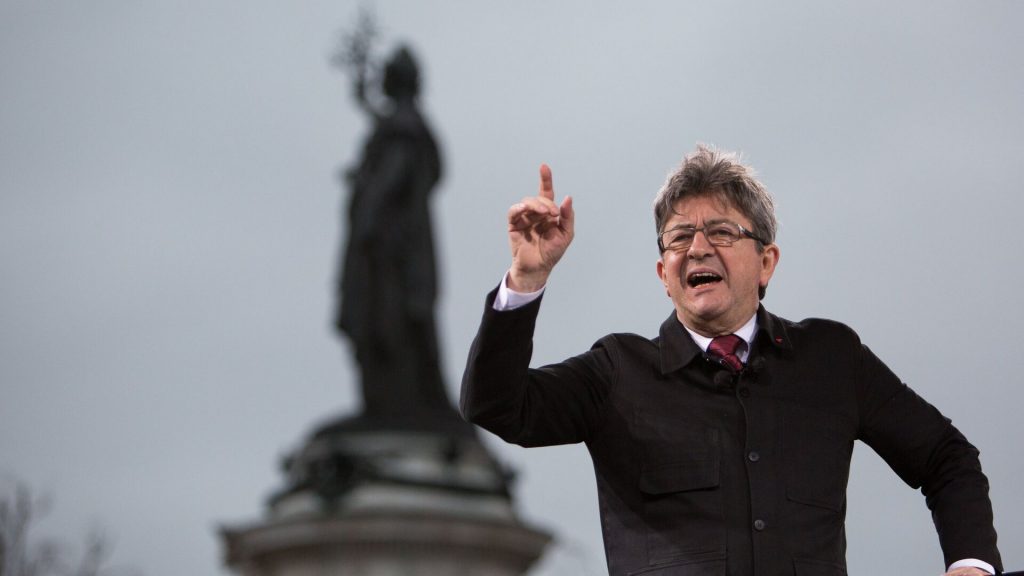
The main winners were the United Left: their parties increased their representation by almost 50 seats, becoming the first force in the French parliament with 180 mandates. On the night of the New Popular Front’s victory, Jean-Luc Mélenchon, head of LFI, gave a joyous and smug speech, claiming a major role in the victory. However, Melanchon should have been more modest – the success was more due to the centre-left. The LFI radicals got about the same number of seats in the National Assembly as they already had – 71. In the party standings, his team lost both to the National Union with 125 deputies and even to the presidential party Renaissance, which took 98 seats. While failing to win the majority Macron might have hoped for, he saved the centre by retaining 159 seats for “Together for the Republic!” with a reserve of potentially allied votes on the right and left – both among the moderate left, the Socialists, and among the moderate right, the “Republicans”, who did not cooperate directly with Le Pen’s party.
Having solved the main tactical task of keeping the extreme right out of power, Macron moved on to the strategic tasks: “revitalise” his second term and form a government coalition without the far left and far right.
No winners and no prime minister
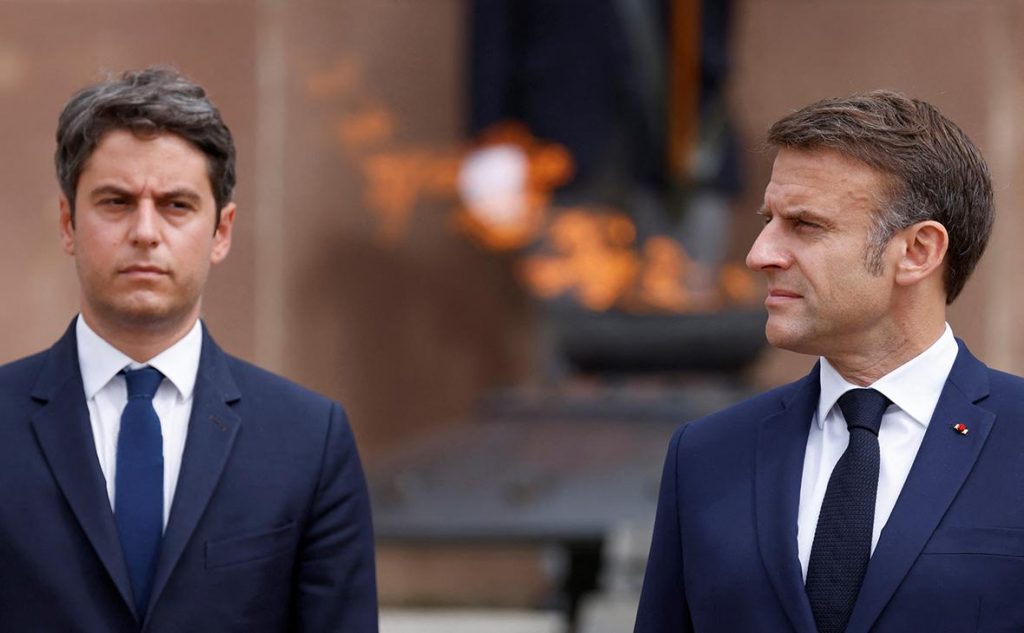
It would seem that after the severe stress test Macron subjected France to by announcing early parliamentary elections, the situation should have calmed down. The most dangerous scenario for the political system – the rise to power of the far-right “National Union” – did not materialise. And, it would seem, the elites could breathe a sigh of relief. But it didn’t. The euphoria lasted for a few night hours, when immediately after the polls closed it became clear that Marine Le Pen’s party was not only not winning, it was still in third place in terms of the number of deputies. But this euphoria quickly passed. The day after the election, the French plunged into a new political reality. No one has a majority in parliament, it is extremely difficult to create a coalition and form a capable government.
Emmanuel Macron was the first to take the floor, breaking the silence he kept after the extraordinary elections and addressing the parliament and the people of France. He did not fail to emphasise that no one won the elections: “No political force on its own won a sufficient majority, all the blocs or coalitions emerging from these elections are in a minority”. Macron thus sent an important signal to everyone that he did not lose the election and is not going to talk from a position of weakness. On the contrary, he went on the offensive, wanting to remove the influence of both the extreme left and the extreme right. He called on “all political forces that identify with republican institutions, the rule of law, parliamentarism, European orientation and the defense of French independence to enter into a sincere and loyal dialogue to form a lasting majority.” Since all the wars against Le Pen’s party were fought in the name of “republican values”, “republican bloc” and “republican barrier”, it is clear who is not wanted in the coalition. The extreme left, which has been noted for its fight against state institutions and secular education, and which has repeatedly supported French Islamists and Palestinian terrorists, is not wanted there either. Thus, Macron has formulated the parameters of a new coalition uniting the entire centre, from centrist Socialists to right-wing “Republicans”.
It must be said that coalition talks are a rare event in a country that usually has a stable one-party majority. That was the point of General de Gaulle’s Fifth Republic, for the president and the government to work in unison, for chaos to be minimised and governability to be maximised. Now things have become different.
The “New Popular Front”, using the right to win, began to put pressure on Macron to entrust the formation of the government to them. It should be clarified that, despite the fact that the French president independently determines whom to appoint as prime minister, the refusal to nominate the candidate who won the election looks like a violation of unwritten political rules. But Macron had his own resonances. “The New Popular Front” turned out to be the only political force that went into the election without naming its own candidate for prime minister. For the left, this is quite a challenge through the serious contradictions between the ultra-left “Unconquered France” and the centre-left Socialist Party. By the way, Macron had previously said that he would not support a prime ministerial candidate from either Marine Le Pen’s party or Unruly France.
Realising that he would not get the post of prime minister, Jean-Luc Mélenchon tempered his political ambitions and proposed instead the candidacy of Huguette Bello, a communist close to “Unconquered France”. The ultra-left leader emphasised that Huguette Bello, who was head of the regional council in the overseas department of Reunion (an island in the Indian Ocean) could become the first non-European head of government. A categorical “no” was immediately heard from the Socialists, who considered the candidate “too radical” and “too close to the LFI”.
Then the Socialist Party, the Greens and the Communists agreed to nominate a “civil society” candidate for prime minister. She was the head of the European Environmental Foundation – Laurence Toubiane, who was a key architect of the 2015 Paris climate accords. However, for “Unconquered France”, this candidature was also unacceptable. They denounced her as a “Macron-compatible” candidate, pointing out that since the start of the president’s term in 2017, Toubiane had often been offered a ministerial post. Thus, everything went according to Macron’s scenario. Having squabbled among themselves, the Left Bloc increasingly began to lose chances to impose its prime ministerial candidacy. Having temporarily put aside the debate on the prime ministerial candidature, the New Popular Front concentrated on agreeing on a single candidate for the post of head of the National Assembly.
Macron’s prospective game
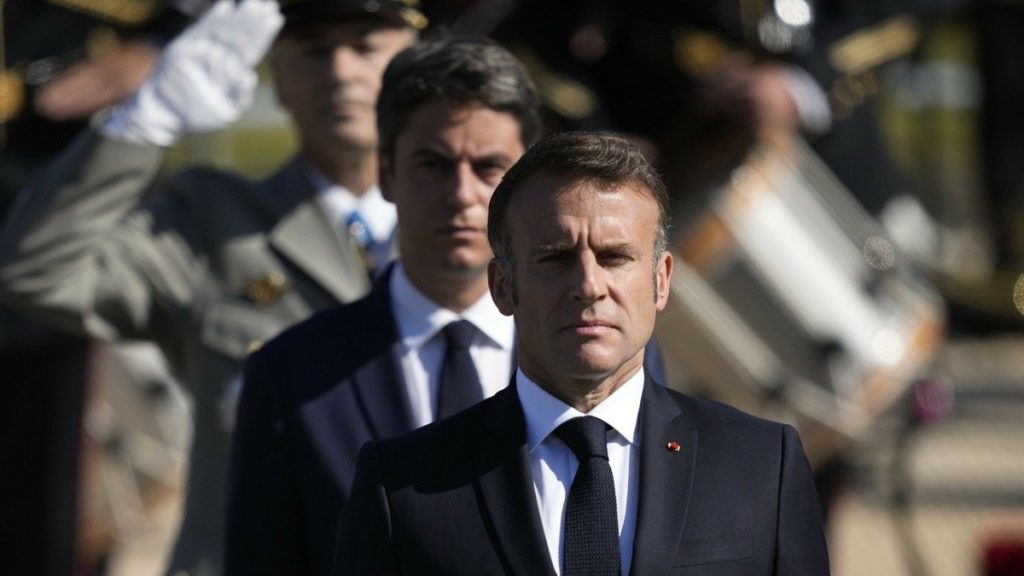
Just before the election of the speaker of the National Assembly, French President Emmanuel Macron resigned the government of Gabriel Attal. It should be said that back in the night from 8 to 9 July, the French Prime Minister wrote a letter of resignation. Having led the election campaign of the Macronist bloc “Together for the Republic!” (Ensemble) at the worst possible moment, he led it to the prize-winning position and contributed greatly to the failure of the RN, which had been in the lead but only came third. At that time, the statement of the Prime Minister and his ministers Macron did not accept, but now he has agreed.
However, the members of the cabinet and its de facto leader will still have to work, at least until the end of the Olympics, so as not to confuse the situation definitively. In addition, and very importantly, the formal resignation has allowed those ministers who were elected to the National Assembly to get down to parliamentary business, strengthening the Macronista group before the first important votes for the head of the National Assembly. Some experts have already labelled the upcoming vote – the election of the Prime Minister – as it will become clear how much real power the different groups, winners and losers, have in parliament.
On 18 July, in the amphitheatre of the lower house of the French parliament, elections were held for the fourth person in the French state hierarchy – the president of the National Assembly. In the last days before the vote, all parliamentary blocs were choosing contestants in the race for positions in the leadership of the National Assembly. After much bickering, even representatives of the left-wing New Popular Front came to an agreement. The main opponents within the bloc – the Socialists and members of “Unconquered France” – entrusted the matter to the “third”, a small number of communists in the assembly. They were represented in the elections by the veteran André Chassin, who had joined the French Communist Party (PCF) under Georges March, at the height of the PCF-CPSU friendship.
He was perhaps the most respected and least rejected of the left. In addition, experts said, half in jest and half in earnest, that André Chasseny was chosen also for his advanced age. At 74, he was the oldest among the candidates, and in case of a tie in the election, according to local rules, the victory is given to the oldest. This could theoretically happen in a third round. Assembly elections are organised in such a way that a candidate must receive an absolute majority (289 votes) in the first or second round. If neither the first nor the second round succeeds, the third round is won by a relative majority.
The Communist’s opponents were former Speaker of Parliament Yael-Brown Pivet of the Macronist Renaissance Party, her rival Macronist ally Naima Muchu of the Horizon Party, and Philippe Juvene of the right-wing Republicans. On the far right flank, Sébastien Chenyou, the candidate of Marine Le Pen’s Rassemblement Nationale (RN), fought against them. The independent candidate of the LIOT group, Charles de Courson, representing the Non-Aligned Movement, also took part in the elections. The unarmed eye could see that the different blocs, left and right, were again trying to turn the elections into a fight against the extreme right or the extreme left.
In the first round, the best result was obtained by the communist Chasseni, who received 200 votes. The second result was RN representative Sébastien Chenyou with 142 votes, in third place was Yael Braun-Pivet with 124 votes, Philippe Juvin collected -48, Naima Muchu with 38 votes and Charles de Courson with only 18. In the end, the Horizon representative and the Republican candidate withdrew. Only four candidates went to the second round. In the second round, Yael Braun-Pivet came out ahead with 210 votes, followed by André Chassin (202) and Sébastien Chenyou (143). Charles de Courson, having received only 12 ballots, decided not to push further, thus freeing up 12 votes – “the most precious votes of the republic”.
Three men went into the third round. After a long and agonising wait, the last round was crowned with success for the government coalition. With 220 votes, Yael Braun-Pivet finally beat the two remaining contenders, a Communist and a representative of the National Union. Yael Braun-Pivet’s victory was secured by the votes of the centre-right “Republicans” and independent candidates. In Macron’s team, the victory vote for the speaker raised hopes that despite the defeat of the left-wing coalition in the parliamentary elections, Macron’s party could still become an influential force and even have a chance to lead the next French government.
However, the “Republicans”, having registered in parliament as an opposition force, hastened to “cool” the victorious mood in Macron’s camp. One “Republican” MP explaining the logic behind their vote said: “We did not intend to elect a communist to head the National Assembly.” And added: “We were elected as the opposition to Macron.” So, the prospect of their further engagement with the president remains very dim.
Other parties in the National Assembly have characterised Brown-Pivet’s re-election as an anti-democratic power grab. Socialist leader Olivier Faure called the election of Macron’s ally after the presidential party’s defeats in European and parliamentary elections “the pinnacle of the denial of democracy.”
Another point of contention was the participation of cabinet ministers in the Brown-Peavey election. Although ministers are not normally allowed to vote in the National Assembly, 17 members of the outgoing government did take part in the vote, given that their resignations had been officially accepted and they were now acting as interim ministers. Brown-Pivet eventually defeated Chassenay by 14 votes. However, as Le Monde noted, experts disagreed on whether the fact that the ministers voted was constitutional.
Following its defeat in the race for the presidency of the National Assembly, the New Popular Front has returned to the search for a prime ministerial candidate and, after consultations within the alliance, nominated a little-known technocrat from Paris City Hall, Lucie Caste. Caste, 37, is a graduate of the prestigious National School of Administration, like the president, Emmanuel Macron. She has been chief financial officer at Paris City Hall since last October, after a decade in senior government positions. Her boss, Paris Mayor Anne Hidalgo, was immediately in favour of the idea, praising her budget management skills.
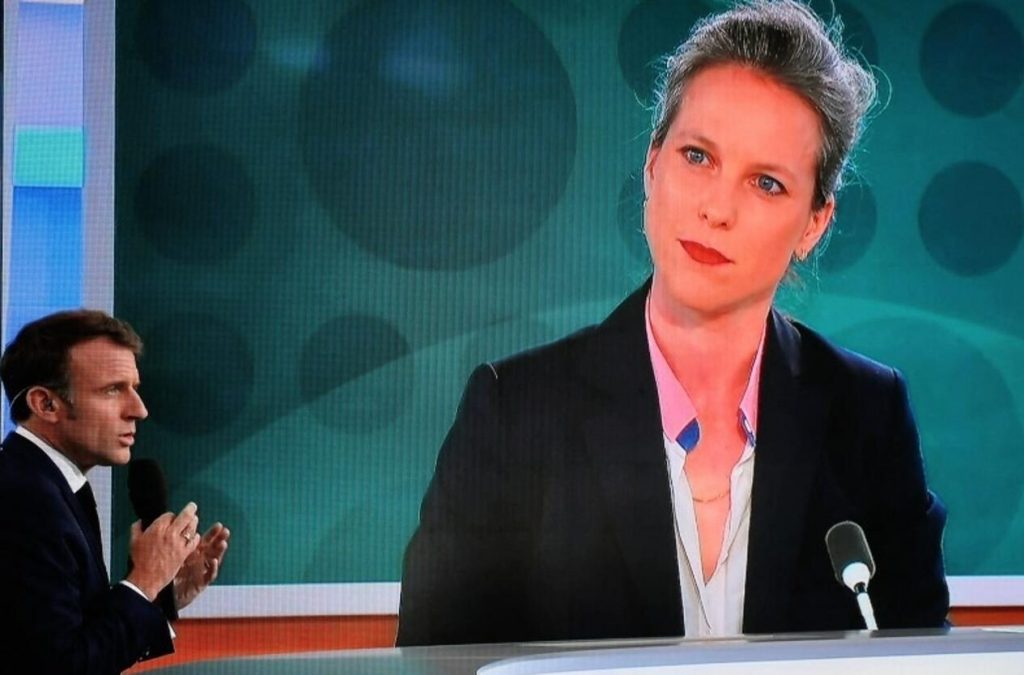
However, French President Emmanuel Macron has rejected the idea that the left should be allowed to form the government. In an interview with France Televisions and Radio France, he once again uttered a phrase that infuriates the left, which is tired of shouting its victory at every corner: “Nobody won this election.” He warned that none of the political blocs, much less the NFP, without a decisive majority, could force him to appoint his desired nominee for the position of head of government. This sounded at the same time a rebuff to the New People’s Front parties, which after three weeks of endless wrangling and intrigue agreed on a single candidate for prime minister – Lucy Caste.
Arguing his position, the president said that the New Popular Front does not have a majority” and cited the recent failure of communist Andre Chasseny, the NFP’s candidate in the elections for the head of the National Assembly. On Mrs Kaste’s candidacy, he did not want to talk about her. “The question is not about the name. The question is who can mobilise a majority so that the French government can carry out reforms, approve the budget and lead the country forward.” Emmanuel Macron said he has no intention of changing the government before the Olympics are over: “Obviously, until mid-August we must focus on the Games and then… I will be obliged to appoint a prime minister and put him in charge of governing.”
The government that is formed, the president insists, must be able to work and not stumble at every turn over the barriers of parliamentary opposition. Macron said he favours an “Olympic pause” in the political struggle and advised politicians to take up sport. There is little hope that his opponents will follow Macron’s advice. New Popular Front MPs have already said they are preparing to introduce legislation in the assembly to repeal a pension reform that would raise the retirement age for workers from 62 to 64, which sparked weeks of unrest in France last year.
Interviewers asked Macron if he was prepared for the fact that the proposal would be joined by the left’s mortal enemies, the deputies of the Rassemblement National, who have also made the abolition of pension reform part of their programme. This is unprecedented: united in the vote, they will be able to dictate their laws to the presidential coalition. As French analysts have already noted, the startling act of political co-operation between parties that would not normally allow a handshake – could undo one of Macron’s hard-won domestic gains.
The president acknowledged that this is a distinct possibility. But he assured that he does not envisage a “new dissolution” of the assembly (which he will be entitled to in a year’s time) and that he himself has no intention of resigning. Since the French have entrusted him with a second presidential mandate, he will remain in office until 2027. Therefore, having put political life on pause, Macron is preparing for the decisive battle by forming his plan of action. In fact, he doesn’t have many options. The most popular prediction is a coalition between the Macronists and the “Republicans”. And while the “Republicans” have publicly stated that such an alliance is impossible, a joint vote for Brown-Peavey makes such a scenario quite likely.
However, the most desirable scenario for Macron is a repeat of the situation in 2017, when the political crisis allowed him to attract both the centre-left and their right-wing colleagues. In short, everyone except Le Pen and Mélenchon’s parties. And in this case, his political force will be the only one to unite both the left and the right. That means that the same evil genius Macron will remain in command of the “parade”. It’s just a matter of “little” – to agree.

